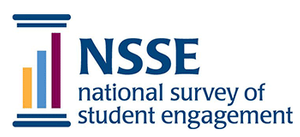
Again in 2015, Catawba College students report that they interact with faculty at a higher rate than students at other Southeast Private institutions and are developing the critical skills wanted by today's employers.
This student/faculty interaction was documented in responses that first-year and senior Catawba students submitted while participating in the 2015 National Survey of Student Engagement (NSSE). For the past 15 years, NSSE has been offered as an instrument to chart national trends in student learning and engagement and as a tool that individual institutions can use to track progress on initiatives to improve student learning.
"What we find from NSSE is that Catawba's mission of providing an education rich in personal attention is born out by what our students experience," said Dr. Michael Bitzer, provost and professor of politics and history at Catawba. "Another important part of Catawba's educational mission — of combining the skills of liberal studies with career preparation — is at the heart of what students gain from their experiences.
"Catawba's seniors report that their critical thinking capability, their written and oral communication skills, the ability to work effectively with others — all the skills that employers want in today's college graduates — are among the abilities they have gained the most in their educational experience," Bitzer said.
The 2015 NSSE collected information from more than 315,000 first-year and senior students attending 541 U.S. institutions in spring 2015. These students self-reported on their participation in activities and programs that promote their learning and personal development. The results provide an estimate of how undergraduates spend their time and what they gain from attending their college or university.
Catawba Seniors
Ninety percent of Catawba seniors who responded to the survey shared that they would "definitely" or "probably" attend Catawba again if given the opportunity, and ninety-four percent indicated an "excellent" or "good" overall collegiate experience. These responses were higher than those given by their peers at other Southeast Privates.
Catawba seniors reported on how much their Catawba experience contributed to their perceived gains in knowledge, skills, and personal development. Eighty-nine percent reported that they gained critical and analytical thinking skills. Ninety-seven percent noted gains in thinking critically and analytically, 88 percent cited gains in working effectively with others, 87 percent in writing clearly and effectively, 79 percent in speaking clearly and effectively, and 76 percent in analyzing numerical and statistical information.
Seventy-two percent of senior respondents perceived they made gains in developing or clarifying a personal code of values and ethics, and also in acquiring job or work-related knowledge and skills. Sixty-seven percent noted gains in solving complex real-world problems and understanding people of other backgrounds. Sixty-four percent noted perceived gains in being an informed and active citizen.
Catawba seniors, like Catawba first-years, also engaged in high-impact practices at slightly higher rates than students at Southeast Privates. As with the first-year respondents, these practices included living in a learning community, service-learning, research with faculty, an internship, study abroad, or a culminating senior experience.
Seniors cited the quality of interactions they had with their academic advisors at a rate of 16 points higher than seniors at Southeast Privates. They also noted at a rate of 15 points higher than their peers that Catawba had an institutional emphasis on attending campus activities and events, and opportunities to be involved socially.
Catawba First-Years
Catawba first-year students reported that instructors provided prompt and detailed feedback on tests or completed assignments at a rate 18 percentage points higher than their peers at other Southeast Privates. These first-years also noted that they discussed course topics, ideas, or concepts with a faculty member outside of class at a rate 12 points higher than their peers at others institutions.
These students highlighted the supportive environment on campus, sharing that the institution placed an emphasis on encouraging contact among students from different background at a rate of 15 points higher than their peers, and reported that they were encouraged to evaluate a point of view, decision or information source at a rate 14 points higher than first-years at other Southeast Privates. Finally, Catawba first-year respondents shared that they used numerical information to examine a real-world problem or issue at a rate 14 points higher than their Southeast Private peers.
Fifty-five percent of the Catawba first-year respondents reported that they had participated in a high-impact practice, including living in a learning community, participation in service-learning, or research with a faculty member. At other Southeast Privates, only 52% reported participating in at least one of these practices.
Catawba first-years rated their overall experience at the institution as "excellent" or "good" at a slightly higher percentage (1 point higher) than did their peers at other Southeast Private "aspirant" institutions.
Eighty-one first-year students at Catawba participated in the survey, while 78 seniors took part in it. Since 2009, Catawba College and her students have participated in NSSE. For complete details on the 2015 NSSE, visit www.nsse.indiana.edu.
